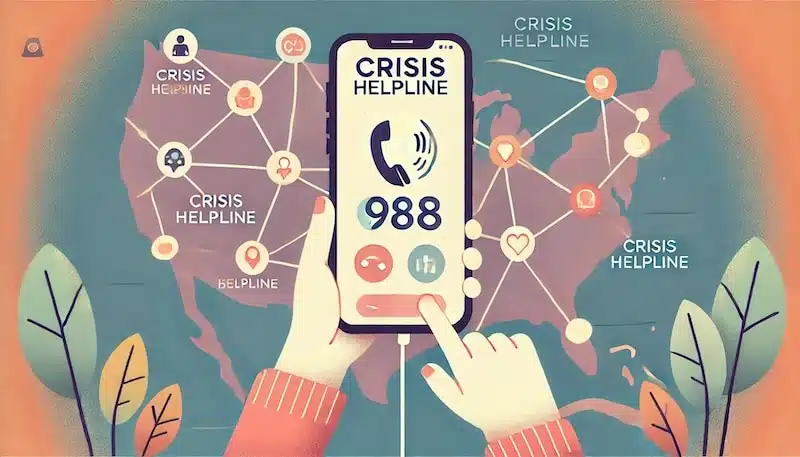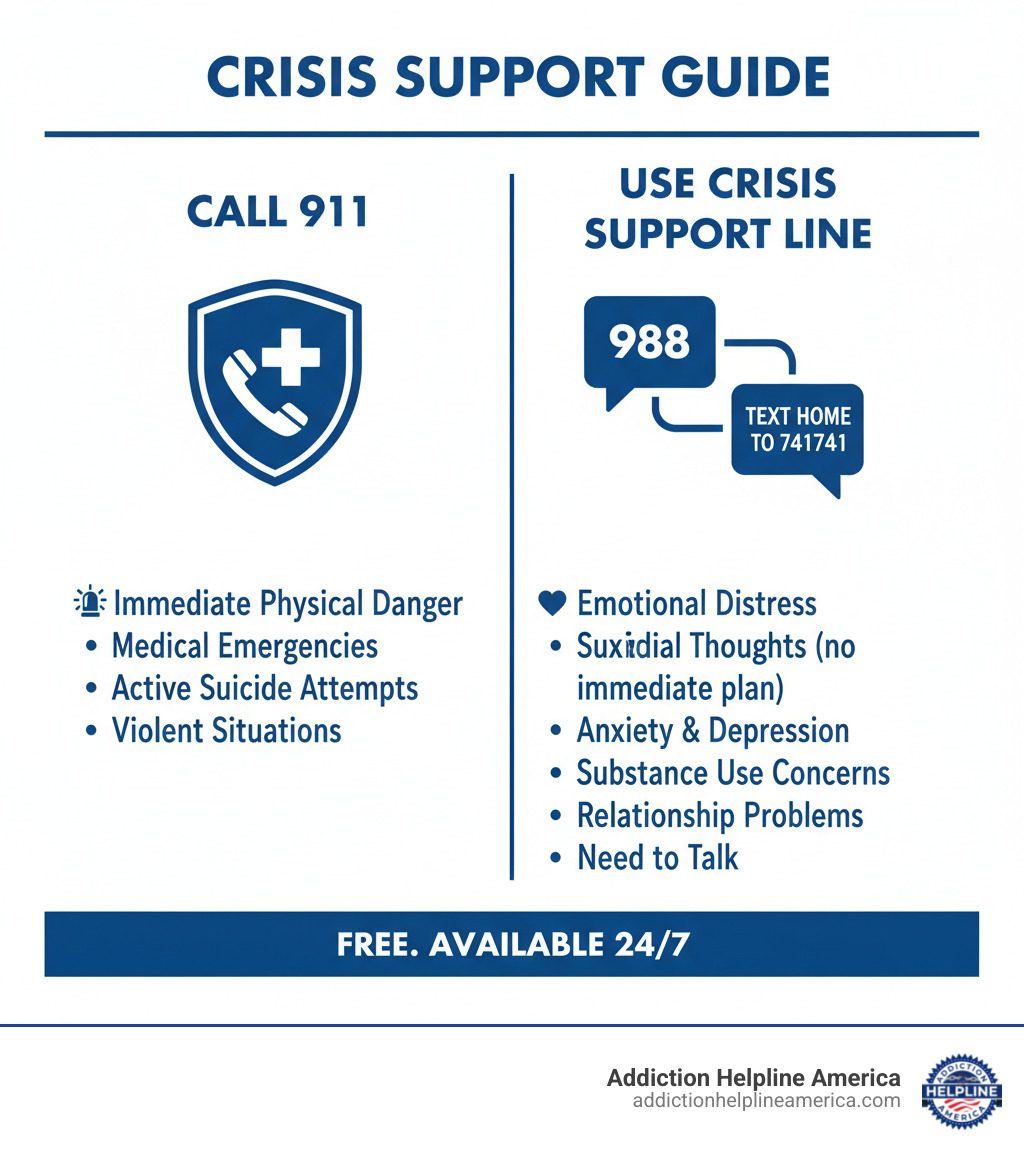
Why Immediate Crisis Support Matters
A crisis support line provides immediate, free, and confidential help when you or a loved one is experiencing emotional distress. Whether it’s suicidal thoughts, overwhelming anxiety, or a substance use issue, support is available right now.
Immediate Crisis Support Options:
- Call or Text 988: The national Suicide & Crisis Lifeline connects you to trained counselors 24/7.
- Text HOME to 741741: Reach the Crisis Text Line for text-based support.
- Call 988 then Press 1: Veterans can access specialized crisis support.
- Call 911: Use this number if someone’s life is in immediate physical danger.
A crisis is a personal experience. It’s not defined by how severe a situation looks to others, but by your own reaction to it. If you’re struggling with anxiety, substance use, or watching a loved one in pain, knowing how to access a crisis support line is a lifesaving step.
The barriers to getting help—like cost, judgment, or finding the right number—have been significantly reduced. The nationwide 988 Lifeline, launched in 2022, simplified access to over 200 crisis centers. You can now reach trained counselors via a three-digit number, text, or online chat.
These services aren’t just for preventing suicide. They help with depression, loneliness, relationship problems, and any situation where you need a non-judgmental ear. At Addiction Helpline America, we know that immediate, compassionate support can turn despair into a path toward healing. Knowing how to get help is the first critical step.

Understanding the 988 Suicide & Crisis Lifeline
What is the 988 Lifeline?
When you dial 988, you connect to a nationwide network of over 200 local crisis centers. This service is the modern version of the National Suicide Prevention Lifeline, simplified to a three-digit number to make it as easy to remember as 911 for a mental health crisis or substance use crisis.
The network is overseen by the Substance Abuse and Mental Health Services Administration (SAMHSA) to ensure high-quality counseling, while the Federal Communications Commission (FCC) helped build the technology to connect you to local help. This streamlined access saves lives by making it simple to reach out in a dark moment.
Learn more about 988 resources
How to Contact 988 and What to Expect
Reaching this crisis support line is simple and available 24/7. You have three options:
- Call 988 from any phone.
- Text 988 if you prefer typing.
- Chat with 988 through their website for a private, screen-based conversation.
When you reach out, you’ll connect with a trained counselor for a confidential conversation. They are skilled in active listening and de-escalation to help you find solid ground.
Using a system called georouting, your call or text is sent to a local crisis center based on your current location, not your phone’s area code. This is vital because local counselors are familiar with your community’s resources, like nearby hospitals or support groups. This connection provides relevant, nearby help while protecting your privacy.
Call Now – Your Journey to Recovery Begins Today!

Take the first step towards a healthier life! Call now to connect with our compassionate team and start your recovery journey today. Your path to healing awaits!
Our recovery specialists are available 24/7 to provide support, and all calls are confidential and free. Reach out anytime – we’re here to help!
Who Can Use This Crisis Support Line?
The simple answer is everyone. The 988 Lifeline is for any person of any age group experiencing emotional distress. There are no requirements for income, insurance, or how “serious” your problem is.

You can reach out for anxiety, depression, suicidal thoughts, substance use concerns, or any other challenge. The line is also available for support for loved ones, so if you’re a parent, partner, or friend worried about someone, you can call for guidance.
Emotional distress can include financial stress, relationship problems, or intense loneliness. At Addiction Helpline America, we know that if a problem is big enough to make you consider reaching out, it’s big enough to deserve help.
Specialized and Alternative Crisis Support Lines
While the 988 Lifeline is a universal resource, some situations benefit from more specific support. There’s a crisis support line designed for veterans, texters, and various communities.
For Veterans: The Veterans Crisis Line
Service members, veterans, and their families can connect with counselors who understand military culture and the unique challenges of service.
- Dial 988 and then press 1.
- Text 838255.
This service is available to all veterans, regardless of their enrollment status in VA benefits. The counselors are trained to help with post-deployment stress, memories of service, and the transition to civilian life.
Text-Based Support: The Crisis Text Line
If talking on the phone is difficult, the Crisis Text Line offers support through text messages. It’s a safe, private way to connect with a trained volunteer Crisis Counselor.
- Text HOME to 741741.
- Chat With Us on their website.

Counselors help you move from a “hot moment” of panic to a “cool calm.” You can text about any issue, including stress, anxiety, bullying, or suicidal thoughts. This format is often preferred by younger people and anyone who finds texting more comfortable than calling.
Information and Peer Support: NAMI and Warmlines
Not every struggle is an immediate crisis. For information and non-urgent support, other resources are available.
- NAMI HelpLine: The National Alliance on Mental Illness offers emotional support, information on mental health conditions, and help navigating the healthcare system. This is not a crisis line. Reach them Monday-Friday, 10 AM-10 PM ET at 1-800-950-NAMI (6264) or by texting NAMI to 62640. You can also visit their NAMI HelpLine Knowledge Center.
- Warmlines: These are staffed by peers with lived experience in mental health or substance use recovery. They offer understanding and encouragement from someone who has been through similar challenges. They are not for crises but for when you need to talk to someone who gets it.
Support for Specific Communities
Specialized crisis support line services ensure everyone can find help that understands their unique circumstances.
- LGBTQ+ Individuals: Dedicated helplines provide a safe space to discuss identity, discrimination, and other concerns without fear of judgment.
- Spanish Speakers: Access the 988 Lifeline in Spanish by calling 988 and pressing 2, texting AYUDA to 988, or using the Spanish-language chat at https://988lifeline.org/es/chat/.
- Deaf or Hard of Hearing: The 988 Lifeline offers videophone and ASL support. Access options are available at Deaf or hard of hearing services.
- Other Needs: For help finding local resources for issues like domestic violence, human trafficking, or homelessness, dial 211. This service connects you to local human and social services in most of the U.S.
Preparing to Use a Crisis Support Line
Knowing when to reach out for help can be the hardest part. A crisis is whatever feels like a crisis to you—if you’re struggling, that’s enough reason to call. Understanding the signs can help you act when you need support most.
Call Now – Your Journey to Recovery Begins Today!

Take the first step towards a healthier life! Call now to connect with our compassionate team and start your recovery journey today. Your path to healing awaits!
Our recovery specialists are available 24/7 to provide support, and all calls are confidential and free. Reach out anytime – we’re here to help!
Recognizing the Signs of a Crisis
It’s time to contact a crisis support line if you notice patterns like:
- A pervasive sense of hopelessness or that things will never get better.
- Overwhelming anxiety, panic attacks, or a constant feeling of dread.
- Extreme mood swings, shifting rapidly from okay to despair.
- Withdrawing from others and isolating yourself.
- Increasing substance use to cope with difficult feelings.
- Thoughts of self-harm or suicide, especially if they are becoming more frequent.
A crisis can also be triggered by job loss, financial stress, or severe relationship difficulties. If it’s causing you distress, it matters.
Hotline vs. Helpline: What’s the Difference?
While often used interchangeably, these terms have different meanings.
- Hotlines (like 988) are for immediate, acute crisis situations. They are 24/7, focused on de-escalation and safety, and staffed by trained crisis counselors.
- Helplines are for ongoing support, information, and guidance. They help with understanding conditions or finding long-term treatment. At Addiction Helpline America, our helpline provides personalized guidance to find the right recovery program.
In short: Call a hotline for a crisis. Call a helpline to plan next steps.
| Feature | Hotline | Helpline |
|---|---|---|
| Purpose | Immediate crisis intervention and urgent assistance | Ongoing support, information, and guidance for long-term care |
| When to Call | Suicidal thoughts, severe distress, acute mental health crisis | Understanding conditions, exploring treatment, finding resources |
| Availability | Always 24/7/365 | May vary (some 24/7, others have specific hours) |
| Conversation Style | Brief, focused on immediate safety and de-escalation | In-depth discussions, personalized guidance |
| Who Answers | Trained crisis counselors | Specialists, peers, treatment navigators |
For specialized support with addiction concerns, you can explore our comprehensive guide: Hotlines for Addiction.
What to Do in a Life-Threatening Emergency
A crisis support line is for emotional distress, but some situations require an immediate emergency response.
If someone’s life is in immediate physical danger, call 911. This includes active suicide attempts, an overdose, violent behavior, or any medical emergency where seconds count. Do not hesitate.
When calling 911 for a mental health emergency, you can ask for a Crisis Intervention Team (CIT) officer. These officers are trained in de-escalation and connecting people to services.
The key difference is that crisis lines help you manage emotional distress, while 911 responds when physical safety is already at risk.
How You Can Contribute to Crisis Support

Every crisis support line relies on a network of dedicated staff and volunteers. If you want to help, there are several meaningful ways to contribute.
- Volunteer Your Time: Organizations like the Crisis Text Line and NAMI depend on volunteers to answer calls and texts. They provide comprehensive training, so you don’t need to be a mental health professional. You can become the compassionate voice on the other end of the line. NAMI offers opportunities to Volunteer With Us.
- Make a Financial Contribution: Donations keep these services free and available 24/7. They fund volunteer training, technology, and operational costs. You can support organizations like the Crisis Text Line and Give Today to help those in crisis.
- Spread Awareness: Simply sharing information about 988 and other crisis services can be a powerful act. Many people still don’t know these resources exist. Talk to friends, post on social media, or share organizational toolkits to spread the word.
At Addiction Helpline America, we believe that normalizing conversations about mental health encourages more people to seek help. Your involvement, in any form, strengthens the safety net for everyone.
Frequently Asked Questions about Crisis Support Lines
It’s natural to have questions before calling a crisis support line. Here are answers to some common concerns.
Is contacting a crisis support line confidential?
Yes, conversations are confidential. This creates a safe space to speak honestly. The only exceptions are to keep people safe. A counselor may break confidentiality only if there is an imminent risk of harm to yourself or others, or if there are concerns about child safety (like abuse or neglect), as required by law. These limits are in place to protect lives, and the vast majority of calls remain completely private.
What kind of issues can I talk about?
You can talk about any issue causing you distress. There is no problem too small. People reach out for support with:
- Anxiety, depression, and loneliness
- Substance use concerns for themselves or a loved one
- Relationship problems or financial stress
- Grief, loss, trauma, or abuse
- Thoughts of self-harm or suicide
If it’s bothering you, it’s worth talking about. Counselors are there to offer non-judgmental support for any challenge.
Will I be forced to go to a hospital?
No, you will not automatically be forced to go to a hospital. The primary goal of a crisis support line is de-escalation and collaborative safety planning. Counselors work with you to manage distress and create a plan to stay safe.
The focus is on empowering you, not taking away your control. Involuntary commitment is an extremely rare last resort, used only when someone is in imminent danger and is unable to agree to a safety plan. This would typically involve involving 911 for imminent danger. Most callers receive support, create a safety plan, and are connected with resources, all while maintaining their autonomy.
Call Now – Your Journey to Recovery Begins Today!

Take the first step towards a healthier life! Call now to connect with our compassionate team and start your recovery journey today. Your path to healing awaits!
Our recovery specialists are available 24/7 to provide support, and all calls are confidential and free. Reach out anytime – we’re here to help!
Immediate, Free & Confidential 988 Crisis Support Hotline
In a crisis, it’s easy to feel isolated, but you are not alone. Help is available right now, 24/7. The crisis support line network exists to provide free, confidential, and non-judgmental support whenever you need it.
Keep these numbers handy:
- Call or text 988: Suicide & Crisis Lifeline
- Text HOME to 741741: Crisis Text Line
- Call 988 then Press 1: Veterans Crisis Line
- Call 911: For immediate physical danger
These services are lifesaving for immediate intervention. However, true healing often requires ongoing support. That’s where Addiction Helpline America can help. We specialize in connecting people to the right treatment and support for lasting recovery from addiction and mental health challenges.
Finding the right program can feel overwhelming. We’re here to provide free, confidential, and personalized guidance to connect you with trusted treatment providers. We’re not here to judge—we’re here to help you find a path forward.
Your next step toward healing is a single conversation. Taking that step is an act of courage.
Find addiction and rehab hotlines
Our helpline is 100%
free & confidential
If you or someone you care about is struggling with drug or alcohol addiction, we can help you explore your recovery options. Don’t face this challenge alone—seek support from us.
Programs
Resources
Will my insurance
cover addiction
treatment?
We're ready to help
Find the best
drug or alcohol treatment
center
Are you or a loved one struggling with addiction? Call today to speak to a treatment expert.















